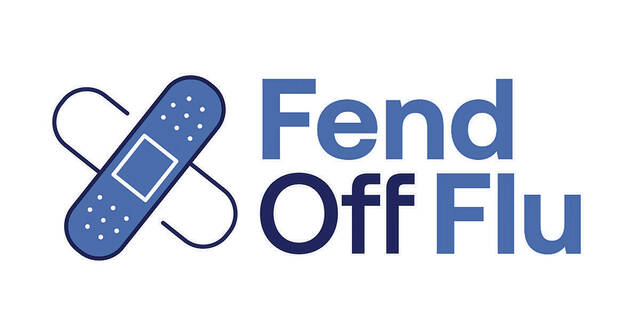
Montgomery

The American Lung Association and Anthem Blue Cross and Blue Shield Foundation are kicking off their Fend Off Flu campaign in an effort to protect those who are most vulnerable.
Submitted photo

Schneck Medical Center is located at 411 W. Tipton St., Seymour.
Submitted photo
Flu season is officially here in Indiana with 682 influenza-like illness cases reported last week alone by the Indiana State Department of Health.
To help prevent the flu in people who are at high risk for severe complications, the American Lung Association and Anthem Blue Cross and Blue Shield Foundation released a toolkit specifically for caregivers of adults 65 and over through their Fend Off Flu campaign.
Influenza is a serious and highly contagious disease that can have severe health consequences for all, especially vulnerable adults 65 and older and those with chronic health conditions.
The new toolkit is a resource to educate caregivers including healthcare providers and personnel in long-term care settings about the flu and the importance of vaccination to protect adults 65 and older.
“Nationally, 50 to 70% of flu hospitalizations were in patients over 65.
“Flu shots are especially important for health care workers and caregivers of vulnerable adults,” Dr. Keith Knuth, medical director at Anthem Blue Cross and Blue Shield in Indiana, said. “Not only will getting a flu shot help reduce the chance of catching the illness, but it will also help reduce the severity if it’s contracted. Especially for people with underlying health conditions, the flu can turn into a serious, even deadly, illness.”
During the 2019-20 flu season, it is estimated the flu sent approximately 380,000 people to the hospital with related complications and caused an estimated 20,000 deaths in the United States, which is why getting vaccinated should be a priority. The flu vaccine is the best protection against contracting and spreading the illness.
“Especially during the ongoing COVID-19 pandemic, routine vaccination is more important than ever,” Tanya Husain, executive director at the American Lung Association, said. “Flu vaccinations have been in use for more than 50 years with hundreds of millions of Americans safely receiving them. It’s recommended that everyone over six months of age receive a flu vaccine, but they are especially important for the 1,093,000 people in Indiana with lung disease as well as their family members and caregivers.”
Lin Montgomery, public health coordinator for the Jackson County Health Department, said everyone should get their annual seasonal flu vaccination.
“The health department has vaccine available, but individuals need an appointment, and we urge people to get vaccinated in the fall for that winter’s flu season,” she said. “Many choose to do so earlier, some later when they get closer to the holidays or winter destinations. We urge vaccinations in the fall, but you can get them at any time.”
She said last year’s flu season was impacted and lessened in severity by COVID restrictions (masking, social distancing, isolation/quarantine, etc.) It is suggested that those restrictions caused the decrease in flu activity here and across Indiana.
Stephanie Furlow, director of marketing and public relations for Schneck Medical Center in Seymour, said the flu rate at Schneck has been very low.
“So far this flu season, of all ED (emergency department) patients at Schneck, only 0.46 to 2.02% have tested positive,” Furlow said. “In 2020, the rate was close to 0%, and in 2019, it was 3.34 to 12.56%.”
She said the peak flu season is January through March, and it is not too late to get the flu vaccine.
“Vaccinated health care workers can help stop the spread of flu-related illness to their patients and coworkers,” Furlow said.
According to lung.org, to lower the risk that adults 65 and over in long-term care settings contract the flu, health care personnel and caregivers should get an annual flu shot.
Adults 65 and over who are at higher risk for developing complications from the flu also are vulnerable to severe disease from COVID-19. The flu and COVID-19 are both contagious respiratory illnesses, but they are caused by different viruses.
The symptoms may seem similar between both the flu and COVID-19; however, flu symptoms occur very rapidly, whereas COVID-19 symptoms take longer to show up.
Additionally, the flu is less contagious than COVID-19, but peopl can be infected with both viruses at the same time. The only way to determine which disease someone has is to visit a health care provider and take a diagnostic test.
The American Lung Association recommends getting vaccinated against both the flu and COVID-19 to prevent infection of both diseases. COVID-19 and flu vaccines can be administered in the same visit if the patient is eligible. If a patient or health care provider are due for both vaccines, it’s good practice to offer both vaccines in the same visit.
In addition to vaccination, the Centers for Disease Control and Prevention recommends these everyday preventive actions: Wash your hands with soap and water for at least 20 seconds, don’t touch your eyes, nose or mouth, cover your cough and sneeze with a tissue or your elbow and avoid close contact with people who are sick.
The Caregiver Flu Toolkit can be downloaded for free at lung.org/fend-off-flu.
To make an appointment at the health department for a flu vaccination, call 812-522-6667.
